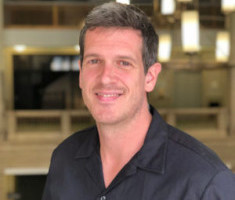-
David DeArmey on Engaging Communities to Increase Water Point Functionality
September 6, 2019 By Benjamin Bosland“Water point functionality goes beyond the mechanical structure of a pump,” says David DeArmey, Director of International Partnerships at Water for Good in this week’s Water Stories podcast. “Community dynamics play a role in how the water point is managed on a daily basis.”
“Water point functionality goes beyond the mechanical structure of a pump,” says David DeArmey, Director of International Partnerships at Water for Good in this week’s Water Stories podcast. “Community dynamics play a role in how the water point is managed on a daily basis.”
After identifying where to place water access points in communities throughout the Central African Republic (CAR), Water for Good helps facilitate a series of workshops to engage local communities with WASH (Water, Sanitation, and Hygiene) training, financial and infrastructure management, and the importance of preventative maintenance. A regional representative from the Ministry of Hydraulics is also incorporated into the training workshops to help strengthen state presence and build a more resilient system. After the bore holes are drilled down to the water table and hand pumps are installed, the NGO performs regular preventative maintenance to replace pump parts that wear out over time to prevent mechanical failures.
A Volatile Context
Since achieving independence in 1960, the country never effectively established a state presence despite being vast, about the size of Texas, DeArmey said. Even basic infrastructure that one would expect for a country to function does not exist outside of the capital city of Bangui. For example, only 400 of the 15,000 miles of road are paved. “But beyond infrastructure, there is a chronic security issue,” he said. Chronic political instability led the country into its second civil war in 2012 with an unprecedented level of violence. Today, nearly 80 percent of the country’s territory is controlled by up to 14 different rebel factions.
Although it operates in a volatile context, Water for Good continues its work in CAR, performing preventative maintenance on water points. Since many of the technicians who inspect the pumps are Central Africans who understand the dangerous conditions on the ground, Water for Good is able to navigate safely throughout the country. Employing Central Africans and training them in the long-term maintenance program protects them. “The communities know them well and they are accepted even in times of insecurity,” said DeArmey.
Peacebuilding in a Complex Setting
“Having the capacity to drill wells, especially in times of conflict, can create unexpected opportunities,” said DeArmey. During the height of the conflict in 2014 and 2015, inter-community tensions caused major divisions between local Christian and Muslim communities. After the Muslim population fled the Lomi District, part of the city of Berberati, the neighborhood began to suffer from an “economic and social void.”
Because the Christian population wanted to ensure that the Muslims had a safe environment to return to within their neighborhood, they decided to create a new water point and invite the Muslim community to return and join them in managing it and sharing its water. “That Christian community served as an example in the rest of the city and beyond,” DeArmey said, “and it created a really positive environment in some of the darkest times of the country. So drilling a well in the Lomi District directly helped engage with peacebuilding in a very complicated setting.”
Friday Podcasts are also available for download on iTunes and Google Podcasts.
Other articles in the Water Security for a Resilient World highlight the connections between water and food security; water as a tool for resilience in times of crisis; the importance of elevating women as water managers; enhancing water security and diplomacy in the Mara River Basin; using data to improve water security; the opportunity for innovative financing to expand access to water; the potential of innovative technologies for global water security; how citizen science can enhance water security; water and livelihoods in the Mara River Basin; the hidden forces of water in economic prosperity; and the challenges and opportunities of too little water, too much water, dirty water, and unpredictable water.
 A Publication of the Stimson Center.
A Publication of the Stimson Center.




